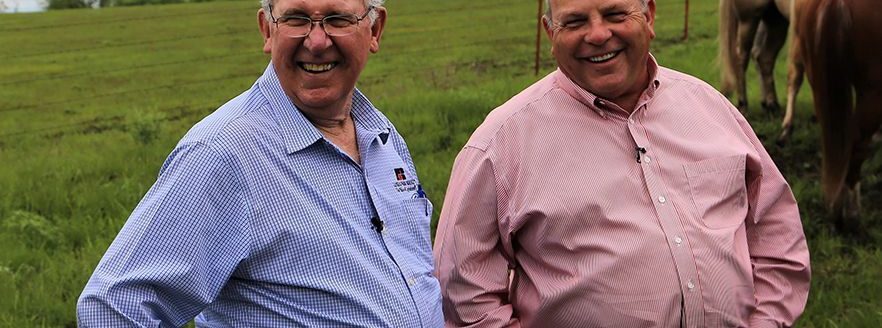If the latest news on trade agreements is as good as advertised, it will benefit farmers and ranchers. But expectations must be taken with a grain a salt, according to a longtime agricultural policy expert.
Barry Flinchbaugh, a professor emeritus in agricultural economics at Kansas State University, said farmers and ranchers needed a boost because net farm income was cut in half from 2012 to 2016. While there has been $22 billion in government payments through the Market Facilitation Program, which was designed to compensate United States farmers and ranchers for a decline in exports, the key to changing the pattern is trade and as of now the latest trade balance is $4.6 billion, which is down from $43 billion in 2014.
If the trade pipeline, particularly with China, can reopen, it offers an opportunity for growth, he said, but only time will tell.
Flinchbaugh offered his thoughts in a telephone interview about the recent trade agreements and other issues of the day.
China grove
Flinchbaugh has been critical of President Donald Trump and his administration for using tariffs in trying to negotiate with China, particularly because of its effect on the bottom line of farmers and ranchers.
“A very strong dollar and a slowdown in economic growth among our customers are part of the problem, but add to that a national sales tax called a tariff and you get the clear picture,” Flinchbaugh said. “The problem is primarily the trade war with China.”
Phase 1 has made some structural changes and Flinchbaugh said if the Chinese honor the agreement that will help.
“It does not address the real culprit—retaliatory tariffs,” he said. “The idea that China will buy $40 billion in agricultural products in 2020 and $40 billion in 2021 when they can get them elsewhere appears to be a fairy tale at best. Then what about 2022?
“I remain to be convinced because of their (Chinese) past behavior,” Flinchbaugh said. “We did not remove our tariffs and they did not remove their tariffs.”
Exports of agriculture products to China have dropped from $22 billion in 2017 to $10 billion in 2019, he said. Ag exports to the U.S.’s top 10 customers have stayed roughly the same excluding China. “In effect our agriculture exports were cut in half because of the tariffs. Tariffs don’t work and they make us less competitive.”
Although he was skeptical, he was willing to have an open mind. Addressing technology theft is important to U.S. interests and that crosses over into agriculture, he said.
“I could easily get real negatively and say it’s not worth the paper it’s written on,” he said. “The big question is whether they will honor their side of the agreements.”
The issues are not new, he said, China has agreed to some structural changes in how it handles biotechnology and the country has said it would follow World Trade Organization rules. China, he said, should have been kicked out of the WTO for repeated violations, but the U.S. and other export countries got lackadaisical, which was never the intent of WTO or its predecessor, the General Agreement on Tariffs and Trade.
“Trade wars never work. They are like lost sleep. Sales lost are sales gone,” he said.
Flinchbaugh also noted the United Kingdom will soon implement Brexit, which means the British will leave the European Union. The repercussions also have an impact on global trade. Brexit, he said, was a step in the wrong direction for the British and EU.
“Now the United Kingdom has to go it alone and do trade country by country,” he said. “It’s all part of political one-upsmanship.”
Flinchbaugh also noted the Trans-Pacific Partnership, which Trump withdrew as a campaign promise in 2016, did offer a way to help the U.S. because it joined with 12 other countries, including Japan, that also wanted to export products to China. The multilateral agreements are effective and in his opinion could force China to level the playing field. Bilateral agreements, he said, are not the long-term recipe for trade success.
USMCA
The United States-Mexico-Canada Agreement is an improved product over the North American Free Trade Agreement, which served all three countries for over 25 years, but was in need of an upgrade because NAFTA did not take into account changes in technology and other matters important to agricultural trade, the ag policy expert said. A new labor standard should help U.S. companies to be more competitive.
The old agreement, for the most part, worked well for agricultural trade, he said, and thankfully the new agreement under the direction of Trump and approved by Congress has kept many of the provisions in place. The president signed Congress’ bill in late January. Canada is expected to ratify the agreement soon.
Improvements in labor standards should help the U.S. be more competitive in manufacturing.
“I think farmers will find some improvement in the markets and it will offer some significant improvement for dairy farmers who we were able to convince Canada to eliminate their program dumping of milk below producer costs and hurt our dairy farmers,” he said.
Concentration
Agriculture is much more concentrated in livestock, and farmers and ranchers should be concerned about the level of concentration in the meat-packing industry with four major companies harvesting more than 80% of slaughter cattle. The number of major seed companies to support grain producers is down to three.
“We need to have a basic discussion again of whether agriculture is getting too concentrated and less competitive. The laws are on the books.”
He said some people believe that four suppliers are enough while other may say two is sufficient as long as there is competition.
“When you go get down to three or four it is very easy for parties to collude. I’m not saying they do or they are not supposed to do that but they are all questions that need to be addressed.”
The anti-trust division of the Justice Department not been as busy as it should or can be, he said. Flinchbaugh tells students that farmers and ranchers buy inputs from a very concentrated segment and they sell the grain or livestock into very concentrated interests.
“That’s what anti-trust division is there to look at,” he said.
Flinchbaugh said the issue is not a new one because agriculture has had many structural changes, but concentration is something that ought to be publicly vetted.
Hemp production
Many states in the High Plains region are looking at the potential of hemp production and growers have a genuine interest in the idea of an alternative crop. He also thinks greater clarification is needed so producers can make an educated decision. How to market hemp on a large scale is still an unknown.
Agricultural hemp is a separate one from marijuana and that also remains an important issue that has to be untangled so producers can better understand the marketplace, the professor emeritus said.
Future of farming
Flinchbaugh remains optimistic about the future of the farming and ranching industry because it is a profession that requires long hours but also offers intrinsic rewards. From a humanitarian standpoint it is an industry that has few equals.
“No one has said it should be easy,” he said. “It is an industry that does attract great minds and entrepreneurs.”
The industry also faces more political pressures than it did even a decade ago and that will take time to sort out. Farmers and ranchers must have a seat at the table particularly as it relates to technology and they have to be reasonable in their approach, too.
“Most farmers say when it comes to genetic engineering and gene editing they will say let the scientists decide. For all the talk you hear I don’t know of anyone who has died from those practices,” Flinchbaugh said.
Farmers and ranchers, if they are going to use that mindset about the importance of listening to scientists on production, they should also apply the same logic on climate change. The political rhetoric is vicious, he said, but the industry itself has to recognize that climate change is important to consumers and public at large.
Farmers and ranchers can help solve the problem.
“But we need to have a seat at the table if we are going to be a part of the solution.”
Agriculture at local, state and federal level has always been a part of the solution. The most recent farm bill was passed on an overwhelming, bipartisan vote in the Senate.
It takes leadership to find bipartisan agreements and solutions, and he commended Sens. Pat Roberts, R-KS, and Debbie Stabenow, D-MI, for their work. With Roberts leaving the Senate in January 2021, those will be tough shoes to fill because of his wealth of information and his willingness to seek compromise.
Dave Bergmeier can be reached at 620-227-1822 or [email protected].


